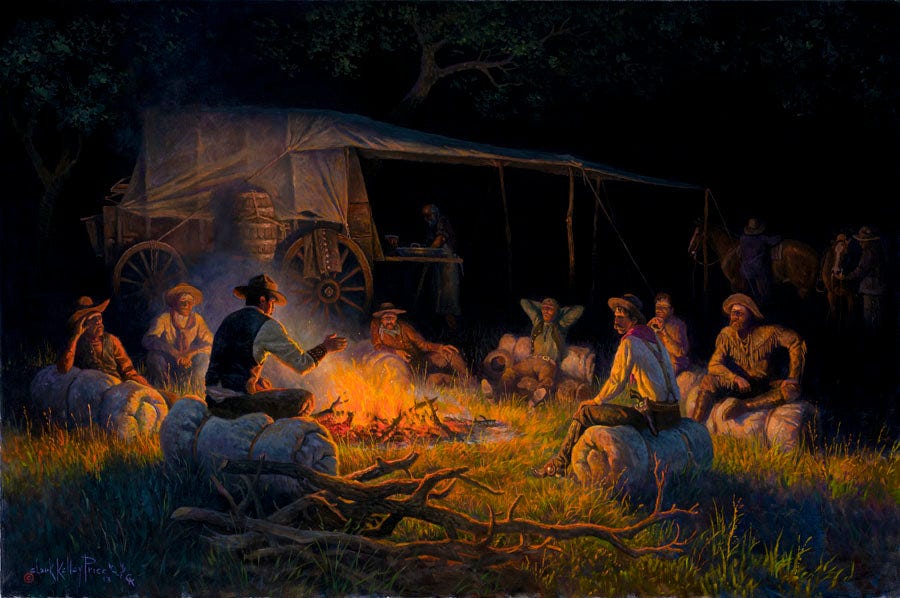In November of 2025, Oregon held its second official Weaving Event. The following is a partial transcript from one of the speeches, given by Dave Greene, The Distributist. The full transcript can be found on their SubStack.
When I received an invitation from the organizers to speak at this dinner, I couldn't resist accepting even though the timing couldn't have been worse, personally and politically.
As everyone probably suspects, this is an inconvenient time to give a speech about politics. Our meeting is taking place just before one of the more major elections in our lifetimes that will fundamentally change our relationship with politics as it exists for the next four years, so the last thing you want to do is make broad pronouncements about the future direction of culture and political organization.
Still, I knew that I wanted to speak to you today, not just because it was an opportunity to hang out with the wonderful West Coast Basketweavers or to talk again with my old friend J. Burden, but also because I was looking for an opportunity to return to Portland, Oregon and see it through new eyes.
I know we aren’t in Portland proper. So perhaps, I should say “the greater Portland area”? Either way, the spirit is the same, and the spirit of Portland played a significant role in my life when I lived here just after obtaining my master’s degree. I arrived in this city very much a liberal (if not a skeptical one) and I left it looking for an ideology that was anything but that.
One of the common questions that people bring to me online all the time, is: “How did you get Red-pilled?”. People expect to hear a story about a time I got mugged or had to deal with a particularly irritating HR cat lady. And, even though I've never had an experience with the former and had far too many experiences with the latter, nothing so acute changed my mind along these lines. Instead, what my time in Portland gave me was a strange set of encounters with certain media-driven cultures, both online and in meat-space that forced me to understand human social organization in a different way.
Case in point, whenever I think back to Portland, I invariably think of the two television shows that had their heyday roughly around the time I lived here. The first, probably predictably, was HBO’s atrocious fantasy series Game of Thrones, regrettably one of the more influential pieces of media that has come out in the last two decades. The second one was the much less well-known IFC sketch comedy show Portlandia, the brainchild of two uber Gen Xers, Fred Armisen and Carrie Brownstein.
I once had a friend who told me that there were two tragic truths about Millennial television culture. The first tragic truth about Millennial television culture was that every Millennial defined their identity by the shows they hated but inexplicably watched anyway. This was certainly true for me. Despite their differences, I intensely disliked Game of Thrones and Portlandia at a philosophical level. Nevertheless, I couldn’t stop watching them, every week, religiously.
I probably don't need to explain Game of Thrones or my feelings about it as I have spoken about it at length elsewhere. But for those of you who are unfamiliar with Portlandia, I can offer a summary. In concept, Portlandia was a broad pastiche of the hipster culture of the late 90s and early 2000s, largely contained within short cutaways that lampooned various petty elements of modern progressive urbanite culture, at least of the older-millennial variety.
I think Portlandia is remembered (to the extent that it is remembered at all) as one of the last instances where progressives were actually able to kind of make fun of themselves.
The main joke of almost all skits in Portlandia was just about how Portland hipsters were lazy slackers who overemphasized creative pursuits over anything practical. Mirroring an earlier age of hipsters or hippies, these were the modern bohemian people who wanted to tune in and tap out. That made them weirdos, the perfect subject for cute non-threatening skit comedy.
As a pseudo-themed song to the show, Brownstein and Armisen released a musical number as a show pilot where the cast claimed that “The Dream of the 90s is Alive in Portland”. This song was making the rounds online just before I moved to the city and was the reason why I watched the show. I wanted to capture that intense romance and enthusiasm of the 1990s I remembered seeing as a child, but that was nowhere present in Millennial college life.
Portlandia described people chasing that Bohemian spirit so many young people wanted. But that’s where the problems started. The show was unwatchable. It was plodding, the characters were irritating and uncool, and it was just plain unfunny.
I suppose the show wasn’t entirely bad. Portlandia could occasionally offer some insight into the minds of modern progressive urbanites. But nevertheless, its main function was to portray the kind of insufferable people who I had to put up with every day as cutesy versions of themselves. The portrayal of this culture needed to be scathing, but the creators depicted these people as endearing jolly townies.
Just like its contemporary Game of Thrones, the M.O. of Portlandia was to tantalize the audience with a payoff that it never delivered. The promised payoff for Portlandia was to expose the essence of the pseudo-Bohenmian Hipster communities that defined modern urban culture. But the only true thing that Armisen and Brownstein ever exposed was this cohort’s deep moral insecurity. And to be fair, insecurity was the most noticeable quality of hipsters in the real-life environments where I encountered them.
Spending my weeks at a workaholic tech job and my weekends exploring downtown Portland, youth culture seemed almost indiscernible, shifting radically from one fad to another, never really focusing on symbols or bands or lifestyles as it did in the 1990s, but obtaining a kind of frenetic pattern that changed so quickly that subcultures didn’t even have proper time to form. And to the extent that these cultures did form, there was something hollow about them, belying a larger insecurity about what the members were doing and the things that they stood for.
But the true magnitude of this problem didn’t dawn on me until I discovered the wonderful world of Steam Punk, a community that somehow existed at the apex of all the worst qualities of both hipster and nerd culture. For those unfamiliar, Steam Punk was a fiction, aesthetics, and role-playing community popular in the early 2000s that revolved around futuristic Victorian aesthetics (think of Jules Verne or H.G. Wells with a more streamlined veneer and occupied by many many more insufferable theater kids). I guess it might be a good question how I got involved in this community to begin with, but suffice it to say being a fan of fantasy and Celtic folk music brought me down certain paths, to the point where I was spending my weekends dressed like a Victorian going to folk rock concerts and role-playing sessions with a very eclectic group of compatriots.
I suppose what made the Steam Punk scene so enticing to me is how close it came to the things that I wanted. I was terribly aware of the deficit in the contemporary culture. There was a spirit that I had encountered in older books and authors that had affected me deeply, and for which I could not find a modern equivalent. And there was a spirit of creativity that I remembered so vividly in American popular culture before the 2000s. What better group to bring these forgotten energies together into something new than the creative types who spent their time writing, doing music, and inventing board games, but who still kept a connection to those powerful old traditions.
It sounds silly in hindsight, to think that this group of grating narcissists could pretend to anything more than extended self-flattery. And one by one the illusions dropped away. Even with all of their fascination with Victorian aesthetics, I was one of the few people who had read any book written before the 20th century outside of a school assignment. Steampunk’s one pretension to anything objectively meaningful was politics. But it was an entirely reflective politics. The opinions that they had gotten from John Stewart precluded them from any criticisms of modern materialist consumerism.
But ultimately the most telling indictment of the “Steampunk community” was that it couldn’t produce any interesting literature.
How was that possible? Steam Punk was inspired by a period known for its great novels, based on some of those old era’s greatest geniuses. How could they fail to write something that even pretended to be good?
Well, it was not for want of trying. The “community” generated huge quantities of text that had the pretension to be literature, but almost all of it was the lowest-tier fanfic trash.
I remember reading a Steam Punk novel that was supposed to be, according to others in the group, a serious piece of literature. Nevertheless, it was little better than the latest standard young adult fiction novel. And I remember discussing the book later with an acquaintance in the scene who was better read than most of the others and asking him about its shortcomings.
If this novel is supposed to be the best of Steam Punk, the best thing that this community can produce. Why is it just a silly adventure designed to titillate the reader rather than really challenge their understanding of the universe? Where are the larger ideas?
At first my friend acted like he didn’t know what I was talking about. What greater themes are you looking for?
Well, gee, maybe those larger ideals that we all could see in novels from the real Victorian period. The things talked about by Rudyard Kipling, or Herman Melville, or Jules Verne or Dostoevsky, the topics of honor, commitment, bravery, virtue, faith, and a connection to spirituality. The things that made something like Ana Karenina interesting even though it didn’t have any mad scientists or airships.
And I remember his response being something to the effect of: “Well, that doesn't sound like very much fun. Does it”?
Then I felt as if the entire energy of the scene deflated out from under me. Something critical about the nature of hipster culture was being revealed.
Ironically enough, I remember returning home and turning on the television to an episode of Game of Thrones that seemed to encapsulate the problem
The episode’s story begins with a pretender queen arriving in a foreign port, looking for a way to return to her Kingdom and restore her reign with only a few remaining supporters at her side. The city she has arrived at is a Merchant republic, and the resources she would need to rule are all there: soldiers, ships, weapons, and horses, all for a price. Unfortunately, the pretender queen has no money to purchase these things, and has to resort to asking the Merchant rulers of the city for loans to buy an army based only on her claim.
Given her rather dismal political position, none of the oligarchs find the prospect enticing. Except for one, a former slave who has inherited his wealth from his dead master. “Trust me.” he says, “I, like you, am an outsider”. He then shows the queen to his house wherein lies a giant vault of the most ornately decorated gold and silver. Behind this vault he says is exactly half of the money that you would need to hire yourself an army and it is only reachable by this golden key. If people understand that you hold the promise of this fortune, other financiers will be more willing to give to your cause, and I can give you this promised support as long as you do some political favors for me.
It seems like a godsend, an easy way to advance her cause and gain a wealthy ally. But then in the course of performing one of these political favors the queen is kidnapped, and it’s clear that her new benefactor has used her to gain political advantage and sold her down the river when her presence was no longer convenient.
Later, when the queen is freed, the pretender monarch returns to her former benefactor to exact revenge and payment. She holds him at knifepoint and forces him to open the vault. The golden key is placed in the socket, the metal twists, and turns, the platinum hinges unhooking, the layers of bolts unclasping, the pressure eases as the massive ornate door slips open only to reveal… nothing
There is no money. There never was. The merchant had organized his entire career on pretending he was rich, taking people’s trust, and exploiting it, and somehow with just the pretense of wealth he was able to wield power over all of his colleagues.
The queen laughs as she beholds the emptiness of it all, and just before locking the merchant in his vault, “Cask of Amontillado” style, she recites this line:
“Thank you for giving me the contents of this vault. There is a lesson here that I won’t soon forget.”
What was that lesson? This was Game of Thrones, so the show never said. It was probably something about the nature of power and aesthetics. But it was the same lesson echoing through Portland late in 2012. It was a lesson about how, in the right circumstances, emptiness itself could be used as a kind of currency of power.
This observation brings me to the second tragic truth of Millennial television culture. And that truth is that no matter what any popular Millennial TV show describes in its plot (be it sci-fi or fantasy or crime drama) its thematic subtext is always fundamentally about “imposter syndrome”.
And isn’t the subject of “imposter syndrome” what ties together both Portlandia and Game of Thrones? The core lesson of the hollow vault?
Insofar as Game of Thrones has a message, that message is that power exists where men think it exists. The question of legitimate ruler-ship is literally a game. The characters brutally war against each other, trying to become the “true king”, but they are all frauds. There is no legitimacy to be had because the trust and honor that this legitimacy relies on has been exhausted, just like the wealth that once existed in the hollow vault.
And this was the same problem that afflicted hipster culture in Portland, mirrored in the television show Portlandia. Everyone was supposed to be here to chase a dream. But they didn’t want to chase a dream, much less fulfill a dream, they just wanted to be perceived as “dreamers” so that they could capitalize on the perceived social status.
The ultimate failure of most modern media products is that they can never just stand up and expose the falseness that they are all built around. That would end the concept of the show, not to mention raise uncomfortable questions for the audience. These shows just wave their hands at the issue and continue on episode after episode with the same banal unchallenging entertainment product, never calling the fraud out directly
But this is indicative of a larger reality. Fraud characterizes our age.
Hipster culture was a fraud. Portland was a fraud. Most of modern media culture was a lie. And as I was beginning to realize almost everything in our culture was a series of pretensions
Our entire society is a collection of systems working at every level trying to pretend to be something that they are not so that they can wield legitimacy that they haven’t earned. These things USED to be real. These systems used to work. These large gilded vessels once contained wealth. But now they don’t anymore. And it’s just a long line of pretenders trying to pass off their hollow vaults as the genuine article.
But how do the pretensions all last? As my friend Mr. Burden is fond of saying, lies can’t last forever.
What was not clear to me then, and became clear to all of us over the years is that the existence of frauds and imposters within a society creates a strange social feedback loop that forms a natural political coalition. The man with the empty vault knows that he is a fraud, but his business and power rely on creating thriving inside an economy of pretense. where the appearance of wealth and power is the only thing that matters. Therefore the second, a true king were to come to power, or a true economy implemented, these people would be immediately exposed and lose whatever position they had. Thus there is a natural conspiracy of those men with hollow vaults, to keep the bubble going, to keep the illusion in place, to make sure that real politics and real spirituality may never awaken inside humanity under any condition.
And this economy of falseness doesn’t exclusively consist of charlatans, but all people who thrive in social situations where political power is doled out on the basis of image and superficial appearance. Lawyers, actors, fashionistas, influencers, the investment bankers who can conjure fortunes out of ink, and the PR managers and spin doctors who can conjure a reputation out of thin air. When appearance is the only mark of truth, the peddlers of gilded fakeness. always make good under such circumstances. This is lunar politics. This is the Theater Kid-occupied government. And the bubble goes on and on until someone comes along and pops it.
I think the story that I have just told might match a lot of the experience of people in the audience. We have all seen the same things at various points in our lives, but what’s less often discussed, and probably what we are meeting here to discuss in much more practical detail, is what to do about our situation, short of just waiting for the rot to collapse in on itself. What should we be doing, what should we be seeking to build?
A large part of the problem is that we have spent so much time in a world of fake-ness, we don’t understand what we are looking for, what real money would be like, what real value and real rulership would feel like.
In modern America the vault is empty and has been for a very long time
But what should have been in the vault?
What do we want? And how do we express these wants in a way that changes the world in a real and positive way?
Taking a step back, we actually have two questions before us: first what creates legitimate and authentic cultures and governance. Second what constitutes a real expression of political will and rulership to guard that way of life.
And, at the risk of being called a reductionist, I think we can answer both of these questions very concisely.
First, what creates legitimacy, or authenticity inside of a culture or other human social organization are true promises and strong faith; what in combination one might call a covenant; the provision of a promised vision about a better future, along with the commitment and belief to persist collectively through the hard times, and make the necessary sacrifices to realize the dream.
This form of covenant outlines every religion, all oaths of office, and all marital vows. It is also, implicitly speaking the form that all true art takes, the aesthetics of any given text bringing forward into the mind of the believer, something that might be followed and made real.
All art must have this kind of promise buried within it as a sincere belief to be true art, and not simply a fascinating piece of kitsch or mere distraction. Certainly, we might learn that some element of what an artist believed might be false, but it is that sincerity of belief that grants the piece its eternal quality because the sincerity reflects a larger living truth.
Subsequently, the only real use of politics is to defend this covenant and the people who are beholden to it. There are only two fundamental political imperatives: to guard the survival of this collective of people bound together in faith, and to ensure their ultimate communion with the divine.
The practice of authentic politics at this primal level must be a broad responsibility of ordinary families, especially those who act as the heads of households. This type of fundamental politics must become a matter of habit, just a thing that we do. No matter what, we move the political order back towards the political interest of the collective and the core faith that it represents.
And I do believe that the groups forming under the banner of "basket-weaving” have captured something of this authentic society and real politics. And I think this is our great advantage when fighting against the falseness of our times.
I periodically send people invites to basket-weaving groups and one person once asked me whether our community-building project was the “real deal”.
I am not sure how to answer that. It is what it is.
We aren’t an alternative government, we aren’t going to build “based-world” imminently. But this community, as small as it is right now, is more real than almost anything you see regularly on the internet. It’s more real than the thousands of hipster identities surrounding consumer lifestyles.
This project is still very much in its early stages but it has advantages. First, it is not dependent on outright lies. But also, this community is one of the few remaining places where you can discuss serious ideas, the kind of ideas you might actually put into action. And now, for the first time, we are accomplishing things on the ground, raising money for mutual aid and disaster support, and organizing volunteers with the work of organizations like the Old Glory Club.
These are all just small steps. But I have every reason to expect more because the foundation is strong. We possess a sincere sense of camaraderie and are committed to the purpose of real politics. That is a powerful combination. And it is ridiculous how few people are attempting to do politics in this way.
Sincerity is a kind of power that fraud cannot wield, no matter how dominant it becomes politically. And that’s our real advantage. As such, our mission will keep making progress if we keep pushing on the opportunities that are presenting themselves.
But there are challenges ahead.
Read the whole thing at the Oregon Weavers SubStack!












This was an excellent essay, and probably more useful now than it would have been had the election turned out otherwise. Reading it leads me to ask what you would consider examples of "real politics," as opposed to fake or lunar politics. I found it easy to think of some, but wonder if you would agree -- if I've managed to grasp what you mean. I hope that you'll understand that these are not meant to be insulting or inflammatory.
I would offer the nineteenth-century Sicilian mafia, Lebanese Hizboallah, and the Afghan Taliban as potential models. All had their origins as practical associations of men who shared a common culture and were forced to respond to greater or lesser degrees of state and societal failure. Each existed in a very different context, and evolved in different ways, but all started at a local scale and either integrated or spread.
If these are valid examples, do you think that it is possible to emulate them without the same degree of cultural conformity that they enjoyed? How much do you think the various "right-wing community-building" organizations that you have experience with actually enjoy such conformity?
[Think I accidentally replied to someone else at first]
Perhaps I'm just making shit up but from my experience as a zoomer growing up around when Millennials were the key drivers of pop-culture there very much seemed to be an archetypical 'Late 2000s dream'. Imagery of tight-knit communities of carefree young adults frolicking in the fields on a trip out in the country with romances blossoming comes to mind here. What is odd (as you speak of often) is how this aesthetic never really translated into reality. Millenial values, in the long run at least never flourished into this. Possibly the biggest task of my generation is going to be taking mere aesthetics and turning them into a living reality - Of course will have to do my own part here and have discussed with my friends how we can potentially start doing our own local roles in this.